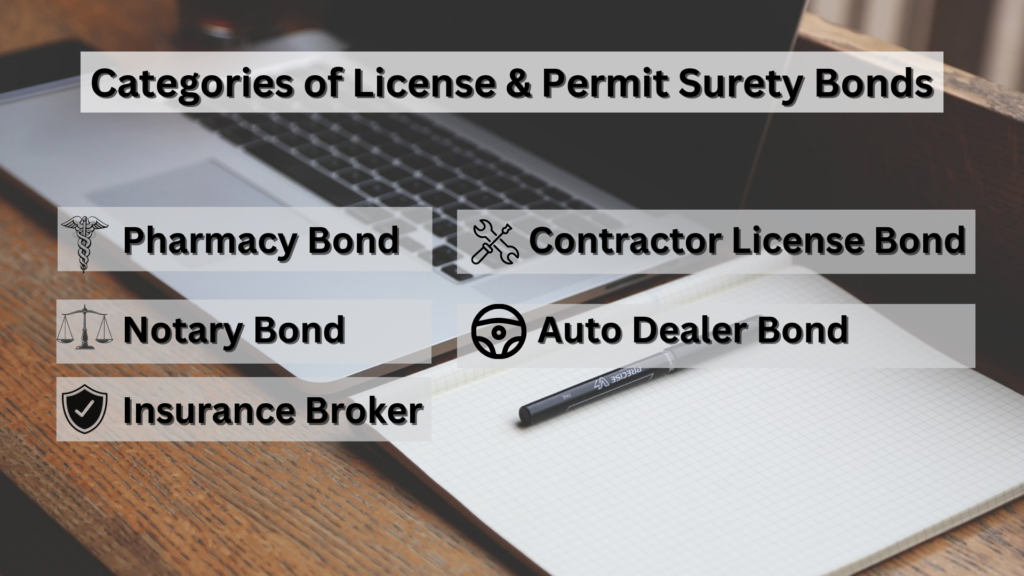What Are License and Permit Bonds
License and permit bonds ensure that a company will finish a project in compliance with the norms and standards of its particular sector.
Surety bonds, also known as license bonds and permit bonds, are often needed purchases for businesses, like construction companies and general contractors. Government authorities at the federal, state, and municipal levels decide which types of professions, including roofers and general contractors, are required to post a bond in order to get a license or a permission to practice their trade.
License and permit bonds provide public entities and private customers the peace of mind that a project your company works on will be finished in line with all applicable state laws, local building rules, and other restrictions. In the event that the conditions of the bond are not satisfied, the insurer is responsible for compensating the agency or the customer.
Advantages Associated with License and Permit Bonds
- Bonds are an essential component of running a successful corporation.
For many different types of work, a surety bond is necessary in order to lawfully do business. It is possible that you may need one in order to get a work permit for a project or to remain in compliance with state licensing rules. - Bonds are a useful tool for luring in new customers.
Your company will have an advantage over its competitors if it employs licensed contractors and subcontractors, since customers are more likely to pick them over those who lack credentials. - Customers will see that you are dependable if you have bonds.
Before providing a bond, surety firms will look at your credit history, which might serve as further evidence that your company can be relied upon. Your customers will also have the peace of mind that comes from knowing they will be compensated in the event that anything goes wrong. - You are able to take on more ambitious initiatives.
Bonded and insured small companies are able to take on government contracts and collaborate with bigger customers that have specific requirements for the sorts of insurance coverage or bonds that they must have.
Categories of License and Permit Surety Bonds
- Pharmacy Bond
As was anticipated, a pharmacy bond serves as an assurance that the pharmaceutical company will correctly handle all shipments and sales authorized by their license and bond insurance. This is the purpose of the pharmacy bond. Several states require pharmacists to deposit surety guarantees before obtaining licenses to operate inside their borders. It is possible for the relevant government agency to charge a pharmacy with a fine and then make a claim against the drugstore’s bond to cover the cost of the penalty. - Notary Bond
A bond is often necessary to become a notary public in most jurisdictions. This bond serves as collateral for the official’s guarantee to adhere to the laws of the state as well as any relevant codes of ethics. Any person or government entity that has been affected as a result of a notary’s failure to comply with these requirements has the ability to file a claim against the bond in order to obtain compensation. - Insurance Broker
Those who are considered to be experts in the subject of insurance are held responsible. When applying for a license to act as an insurance broker, documentation of a bond is required by the majority of states. As a direct consequence of this, customers of insurance companies are protected against broker fraud. - Contractor License Bond
The vast majority of jurisdictions need contractor license bonds in order to allow licensed contractors to properly do business and offer services to members of the general public. A business professional who wishes to get a contractor’s license bond is required to provide proof that they have complied with all rules and regulations that are designed to shield the general public and the government from any financial damage. In order to save the public money, government entities often employ the services of contracted contractors. - Auto Dealer Bond
Customers are protected against vehicle dealerships and their employees by this surety bond. Given the significance of the automotive industry in our economy, protecting consumers against car fraud is a top priority. A license to sell motor vehicles requires the applicant to post a bond. The dealership and its employees may then be certain that they are in compliance with federal regulations governing the sale of motor vehicles.
